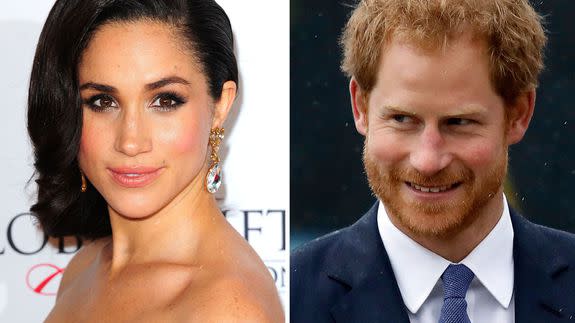Why the royal statement on trolling is unprecedented

LONDON — Prince Harry has lambasted 'racist and sexist' trolling and media coverage of his girlfriend Meghan Markle in an unprecedented statement on Tuesday.
A spokesperson for Kensington Palace confirmed to Mashable that this is the very first time a statement issued by the royal family has ever referred to "online commentary".
It said Markle had been "subject to a wave of abuse and harassment" online and that a line had been "crossed".
SEE ALSO: Prince Harry hits back at 'sexist and racist' trolling of girlfriend Meghan Markle
Kensington Palace explicitly names "the outright sexism and racism of social media trolls and web article comments" as a critical issue faced by Markle in addition to harassment from photographers and reporters.
Kensington Palace has issued a statement this morning about the harassment currently being experienced by Meghan Markle and her family. pic.twitter.com/EuFZ4fmUIj
— Kensington Palace (@KensingtonRoyal) November 8, 2016
The statement said that harassment from the press had seen photographers and a reporter attempt to illegally enter Markle's home, in addition to a swarm of photographers outside her mother's front door. Not to mention attempts by the media to bribe people with personal links to Markle - including her ex-boyfriend.
Anti-racism charity Stand Up to Racism commended the palace's actions in calling out the racist comments. "Racism is wrong and must be stood up to no matter who is the victim. Racism should not be used to lampoon the privileged," Sabby Dhal of Stand up to Racism said in a statement emailed to Mashable.
The royal family has a longstanding issue with press harassment
This is by no means the first time members of the royal family — and those connected to them — have spoken out about harassment from the press. But it does indicate a change in the type of harassment they're experiencing. And it signals a historic change in how they are using digital media to respond to it.
On the night Diana Princess of Wales died, her car was chased by paparazzi through the streets of Paris. An inquest into her death named this as part of the cause of the fatal accident which led to her death.
In 2007, Prince William complained about the paparazzi's "aggressive" and "dangerous" hounding of his then girlfriend Kate Middleton. Most recently, the Duke and Duchess of Cambridge issued a statement stating that both their children should be free to play in public and semi-public spaces "without being photographed".
So, what's changed?
While harassment from paparazzi was the dominant issue for Kate Middleton from 2007 onwards, Prince Harry's statement on Tuesday gives equal weight to the issue of trolling and online harassment — suggesting that the royal family is also reacting to the way the partners of royals are being targeted.
But, it's also indicative of social media's impact on behaviour and society. Recent research shows online harassment has become "an established norm in our digital society" — one that's nearing "epidemic proportions".
Research by the Pew Research Centre found that 73 percent of adult internet users have witnessed someone being harassed online, and 40 percent have personally experienced it.
The same research revealed that young women are experiencing particularly severe forms on online harassment — and 38 percent of those harassed reported the harassment as "extremely" or "very" upsetting to them.
What will happen now?
The royal family is entering a new realm in which online harassment is an unwelcome intruder.
No stranger to taking legal action, they may make use of the newly introduced laws on online harassment, where internet trolls can be prosecuted.
Today's development heralds the beginning of a new chapter for the royal family — one where online harassment adds an additional layer to the longstanding issue of press harassment.
